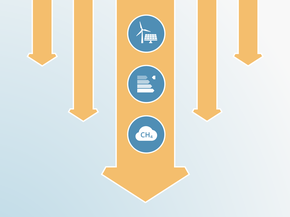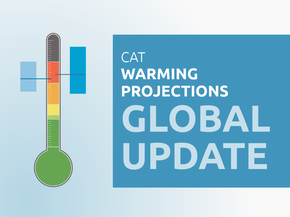Country summary
Overview
Mexico’s climate policies under President Lopez Obrador continue to go backwards, as fossil fuel use is prioritised and climate-related policies and institutions dismantled. This puts the country’s emissions pathway even further from the Paris Agreement 1.5°C goal. Mexico’s greenhouse gas emissions continue to rise – despite the brief dip caused by the COVID-19 pandemic – and are projected to continue increasing through 2030. For Mexico to achieve even its outdated 2030 climate commitments, it needs to reverse its policies, move away from fossil fuels, foster renewable energy, and tackle the transport sector.
The current government, under a discourse of “energy sovereignty” and “republican sovereignty”, continues to choose policies that prioritise the use of fossil fuels and deprioritise climate change mitigation.
Instead of investing in renewable energy, Mexico has acquired an oil refinery in the US and is fast-tracking the construction of another in Dos Bocas, Tabasco. These actions were included in the ten ‘climate’ actions Mexico is committed to pursuing in the coming years, presented by President Lopez Obrador at the Major Economies Forum on Energy and Climate held by President Biden in June 2022.
Lopez Obrador’s government also continues to subsidise the use of fossil fuels in the transport sector as a response to the global energy crisis and inflation rates that have stemmed from Russia’s illegal invasion of Ukraine. As part of the Federal Budget for 2021 and again in 2022, over 70% of the budget under ‘climate change mitigation and adaptation effects’ has been allocated to the transport infrastructure of fossil gas.
Reforms to the General Climate Change Law in 2020 eliminated the Climate Change Fund and in 2021, the government announced the dissolution of the National Institute for Climate Change. The dismantling of climate change governance sends a clear message to Mexicans and the international community that climate change and the environment are simply not a priority in Mexico.
However, Lopez Obrador’s party lost its qualified majority in congress in the 2021 elections, enabling its political opposition to stop the executive’s proposal to reform Mexico’s energy system in April 2022. With this proposed reform, the government intended to limit the participation of private electricity producers and disestablish the National Centre of Energy Control (CENACE) and the Clean Energy Certificates. Prior to the vote against the energy reform, a massive civil society protest movement created a public debate on the implications of the proposal—sending a clear message to the government that Mexicans are concerned about climate change and their future.
In 2021, after civil society won an ‘amparo’ lawsuit (under the constitution) against the lack of ambition of Mexico’s December 2020 updated NDC, a judge reinstated Mexico’s original 2016 climate targets. The reason for this decision was that Mexico’s updated climate commitments, albeit unchanged in terms of reduction percentages, resulted in a higher emissions level due to an upward revision of the baseline. It also was less transparent than the original and excluded the target of peak emissions in 2026. The court also reinstated the 2050 goal from Mexico’s Mid-Century Strategy. Sadly, the ruling did not issue a mandate for the development of new 2030 and 2050 targets.
The CAT rates Mexico’s climate targets and policies as “Highly insufficient”. The “Highly insufficient” rating indicates that Mexico’s climate policies and commitments are not consistent with any interpretation of a fair-share contribution and lead to rising, rather than falling, emissions, with an exception being Mexico’s conditional NDC target, which is slightly lower than emissions at today’s level. We rate this internationally supported target as “Insufficient” as it is not consistent with Mexico’s 1.5°C modelled domestic pathway, and the unconditional target as “Critically insufficient”, meaning that this target is falling far behind the country’s fair share contribution.
We rate Mexico’s policies and actions as “Highly insufficient”. The “Highly insufficient” rating indicates that Mexico’s policies and action in 2030 lead to rising, rather than falling emissions and are not at all consistent with the 1.5°C temperature limit. If all countries were to follow Mexico’s approach, warming could reach over 3°C and up to 4°C.
Under the government of President Lopez Obrador Mexico’s climate policies have gone backwards—largely because it continues to choose policies that prioritise the use of fossil fuels under the discourse of energy sovereignty and republican austerity. Since Lopez Obrador’s election in 2018, several policies supporting renewable energy and climate change in general have been rolled backed or reformed. In January 2019, the Mexican government cancelled long term electricity auctions – instruments that had incentivised an increase in renewable energy for electricity production in Mexico over three years – and reverted a former government decision to retire the oldest and dirtiest electricity fossil-fuel power plants.
In 2020, the Mexican Ministry of Energy published a bill that would effectively halt private renewable energy investment in the country, prioritising the government's own ageing, fossil fuel-fired power plants. More recently, the government allocated most of the ‘climate change mitigation and adaptation’ budget in 2021 and 2022 to fossil gas transport infrastructure. It is building an oil refinery in Dos Bocas, Tabasco, has acquired one in Texas, US, and continues to subsidise the use of fossil fuels in the transport sector.
Since 2013, Mexico has continued to report its historical emissions at much higher levels than the already high emissions projections under the NDC baseline submitted in 2016. Emissions from the energy sector increased by 34% between 1990 and 2019. This sector alone was responsible for nearly two thirds of all greenhouse gas emissions in Mexico in 2019 (aside from the forestry sector). Nearly a third of projected emissions are expected from the transport sector in 2030.
In December 2021, a new version of the Special Climate Change Program (PECC, in Spanish) was published, outlining objectives, strategies, actions and goals related to climate change mitigation and adaptation. Its Objective 2: “reduce greenhouse gas emissions” lists a number of actions regarding renewable energy, which seem to contradict the rollback of energy policies in recent years. Other actions are focused on increasing efficiency in fossil fuel generation plants or mitigation in oil & gas extraction – contradicting the transformative decarbonisation measures needed to achieve the Paris Agreement goal.
During his speech at President Biden’s Major Economies Forum on Energy and Climate in June 2022, President Lopez Obrador presented ten ‘climate’ actions his government is prioritising in the next years. Two of these actions include ramping up fossil fuel production to achieve energy sovereignty by modernising six oil refineries, acquiring one in the US and building a new one in Dos Bocas, and building two new coke plants to be able to domestically transform fuel oil into gasoline.
We rate the conditional NDC target of 36% greenhouse gas reduction from a business as usual baseline in 2030 as “Insufficient” when compared to modelled domestic emissions pathways. The “Insufficient” rating indicates that this target needs substantial improvements to be consistent with the 1.5°C temperature limit. If all countries were to follow Mexico’s approach, warming would reach over 2°C and up to 3°C.
Mexico submitted an updated NDC in 2020 which it revoked in October 2021 after civil society won an ‘amparo’ lawsuit under the argument that Mexico’s updated climate commitment was less ambitious than its 2016 predecessor – contrary to the Paris Agreement and Mexican law. Despite repeating the same percentage reduction as the 2016 NDC, the updated climate target was less transparent, eliminated the 2026 emissions peak year and provided a higher emissions baseline. We have recalculated Mexico’s internationally supported target using the 2016 NDC submission1.
During the Major Economies Forum on Energy and Climate held by President Biden in June 2022, Mexico mentioned its intention to submit an enhanced 2030 NDC target in line with the Paris temperature goal ahead of COP27.
We rate Mexico’s 2030 unconditional NDC target of reducing all greenhouse gas emissions by 22% under a business as usual scenario in 2030 as “Critically insufficient” when compared with its fair-share contribution to climate action. The “Critically insufficient” rating indicates that Mexico’s fair share target in 2030 reflects minimal to no action and is not at all consistent with the 1.5°C temperature limit. Mexico’s target is not in line with any interpretation of a fair approach to meeting the 1.5°C limit. If all countries were to follow Mexico’s approach, warming would exceed 4°C.
We have also recalculated Mexico’s fair share target based on the 2016 NDC emissions baseline1.
The land use, land-use change and forestry has been a stable sink in Mexico over the last 20 years.
1 Absolute emissions are slightly different than in previous assessments due to an updated emissions factor used to convert emissions to global warming potentials form IPCC’s fourth assessment report—the CAT standard.
Further analysis
Latest publications
Stay informed
Subscribe to our newsletter




